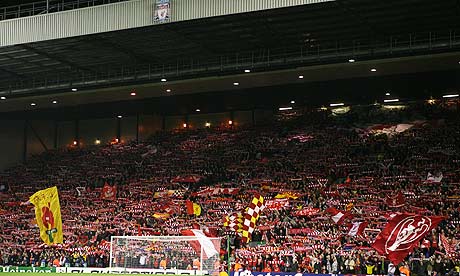New England Sports Ventures, the company bidding for control of Liverpool, is on a collision course with the city's council over plans to redevelop Anfield. The Liverpool chairman, Martin Broughton, has confirmed the club's prospective new owners NESV – which has a track-record in redeveloping a sports stadium with the Boston Red Sox – will consider upgrading Anfield if a £300m offer to gain control from Tom Hicks and George Gillett is accepted in the high court next week. It is understood that a commitment to put £100m towards a new stadium had previously been a condition of the sale.
The leader of the council, however, insists a U-turn on the stadium would be unlikely to gain approval. "I would discourage them [NESV] from redeveloping Anfield and would encourage them to stick to the commitment that is already in place because I think that is the best solution for everyone – for the club and the city," councillor Joe Anderson said.
NESV's offer was accepted after it increased the equity involved to £240m, matching a rival bid from Asia, and Anderson believes the new stadium must be the priority for the club as he attempts to safeguard the area's regeneration.
Other sources say the same planning obstacles that prompted the former chairman David Moores and the then chief executive, Rick Parry, to propose relocating across Stanley Park still exist, leaving NESV facing the potentially greater expense of a new build.
NESV had to commit to a stadium project during negotiations with Liverpool and still intends to revisit existing plans for a new 60,000-seat arena on nearby Stanley Park. However, considering upgrading Anfield represents a radical departure from the past decade of club and council policy. As far as the council is concerned, that policy has not changed, and with much of the present stadium landlocked in a residential area NESV would have to overcome major obstacles to increase Anfield's capacity to its desired figure of 60,000-plus. These include the purchase of nearby houses to make way for new stands, which Liverpool have already done to some degree, improving public access and objections to a development that would tower over local properties.
A separate, though fundamental, reason for the council's desire for a new stadium – which has planning permission that is due to expire in April 2011 – is to see the creation of the proposed Anfield Plaza on the site of the existing stadium. The Plaza, containing shops, offices and restaurants, is intended to provide a public link to the new arena, but also an estimated 1,000 jobs in one of the most deprived local authority wards in Britain.
This was a key condition in Liverpool obtaining permission to build on public land in Stanley Park and, despite the change from a Liberal Democrat to a Labour council at the last election, it remains a priority for local politicians and residents.
Cllr Anderson, who welcomed the potential change of ownership as "a huge relief", said: "It has been suggested to me that NESV would be willing to meet at the earliest possible opportunity in the event of the takeover and I would urge them to do that to give me the opportunity to find out exactly what their intentions are, because the stadium is a key part of our plans to regenerate north Liverpool.
"Those plans haven't been held up entirely by the stadium situation and it would be wrong to say that they have. But they have had an impact and we just want to be in a position where we have a clear sign that the stadium issue will be resolved one way or another, something Hicks and Gillett failed to do despite the string of promises they made."
NESV members have paid several visits to Liverpool in recent weeks but, with control of the club not yet sealed, have not reached the negotiating stage with the council. They have, however, held discussions with the Royal Bank of Scotland over funding any stadium plans and, unlike Hicks and Gillett, who made themselves hostage to fortune with a promise to "put a spade in the ground within 60 days" of their takeover in February 2007, are reluctant to commit to one proposal at this juncture.
John W Henry the principal investor in NESV, overcame major difficulties to redevelop the historic home of the Boston Red Sox, Fenway Park, although at the cost to the fans of vastly increased ticket prices. Broughton said: "They are going to look at a new stadium but they have experience at Boston of redeveloping an old stadium and just want to be sure they have exhausted all options before deciding on which one, but the commitment is they will do one or the other."
Liverpool's need for improved revenue streams from a new stadium is pressing and was a principal reason why Moores sold his majority shareholding to Hicks and Gillett in 2007. Club accounts for 2008-09 financial year showed Liverpool made £42m from gate and matchday income. In the same period Arsenal made £100m at the Emirates Stadium and Manchester United generated £109m at Old Trafford.
Liverpool is a host city for England's 2018 World Cup bid but with Anfield's capacity over the 40,000 threshold, and NESV committed to some form of rebuilding, that status is not at risk.

No comments:
Post a Comment